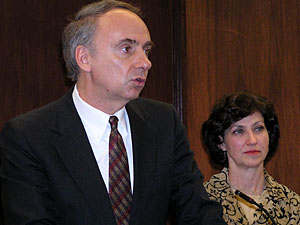Photos
Resources
Your Voice
| ||||||||||||||||||||||||||||||||||||||||||||||||
State's budget situation better than expected
February 27, 2004
 |
| State economist Tom Stinson says the forecast projects strong economic growth. (MPR Photo/Laura McCallum) |
St. Paul, Minn. — In recent weeks, some legislative leaders had predicted a deficit as high as $500 million. So the announcement of a $160 million shortfall was viewed as relative good news. That's about half of one percent of the state's two-year budget, and pales in comparison to the $4.5 billion lawmakers tackled last year.
"It's a lot of money, but it is so much smaller than we have dealt with in the past; there are a fair number of options for dealing with it," said Gov. Pawlenty's chief of staff, Dan McElroy.
 | |||
McElroy says Gov. Pawlenty will release his recommendations for solving the problem next week. Finance Commissioner Peggy Ingison says she'll probably advise the governor not to use much of the state's budget reserves. Minnesota has cash reserves of more than $600 million, but Ingison says the financial cushion should be even larger.
"The goal is to have 5 percent of your biennial spending in a budget reserve, and we're under 2.5 percent," she said.
Ingison says bond rating agencies may also frown on dipping into the budget reserves, and respond by lowering the state's bond rating. That would make it more expensive for the state and local governments to borrow money. One agency, Moody's, has already downgraded Minnesota's rating from triple-A to double-A-1.
Republican legislative leaders had been talking about tapping the reserves last fall, but now they say gaming revenues could plug the budget gap. House Majority Leader Eric Paulsen of Eden Prairie says the state should allow slot machines at the Canterbury Park racetrack at Shakopee.
"We'd like to see some more emphasis on racino, because I think it's what Minnesotans by a vast majority -- 70 percent plus -- are looking for," he said.
The "racino" could raise an estimated $100 million a year for the state. Senate DFL leaders don't like the idea. Majority Leader Dean Johnson of Willmar says the Legislature shouldn't use gambling proceeds, which can take big swings up and down, to balance the state budget.
"And all we need to do is look at some of the other states that have incorporated gambling into their budgets, California being one of them, and I do not think that we want to be another California," Johnson said.
Johnson says while the deficit is relatively modest for the current two-year budget cycle, the picture is much gloomier for the next biennium. The forecast projects a $441 million deficit in 2006 and 2007, and if inflation is taken into account, the number jumps to more than $1 billion.
The Legislature made significant budget cuts last year, and advocates for low-income Minnesotans worry about the prospect of more cuts. Marcia Avner of the Minnesota Council of Nonprofits says the financial outlook is bleak.
"We don't think the budgets are under control for families that have lost their health care. Minnesota has over 13,000 families who've lost their health care. It's not under control for the 1,200 Minnesota families that lost their child care," she said.
Avner says it's clear that lawmakers won't consider raising taxes this year, but she says taxes should be on the table in 2005. While there won't be much talk about tax increases this session, the budget forecast has renewed the stadium debate. Many lawmakers said if the deficit was larger than expected, there would be little appetite for stadium proposals. Now that the number is $160 million, legislative leaders say a new stadium is in play.
Gov. Pawlenty is expected to announce his stadium recommendations a few days after he comes out with his budget fix.
|
News Headlines
|
Related Subjects
|

